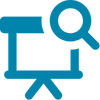Thank you for your interest in the ELI Annual Meeting! This event is a gathering for everyone working in postsecondary teaching, learning, and student success. The diversity of this community affords opportunities for rich conversations, valuable networking, and the chance to spawn new initiatives and collaborations. The annual meeting is the opportunity to present your work, discoveries, insights, and tools with your colleagues for the benefit of the entire community. We welcome your submission! Please read this page carefully before you begin work on your proposal and be sure to submit by the deadline: February 23, 2022.
If you or a co-presenter are a corporate member, you have two options:
- You can go through the CFP process, in which case the ELI program committee will determine acceptance to the program.
- You can contact [email protected] to purchase an Industry and Campus content session and will receive specific instructions about how to submit your session details. Limited opportunities are available.
Ready to get started? Just follow these simple steps:
- Find out how to create an excellent proposal by reading this page and the helpful tips in the EDUCAUSE Presenter Concierge pages.
- Develop a proposal in one of the program theme/focus areas. For a sneak peek at the CFP submission form and to share for collaboration, you may download or copy and share this Sample CFP Submission Form.
- Choose a session format and whether you prefer to give your presentation in-person (June 8–10 in San Diego) or online (at the virtual event in mid-June).
- Submit your proposal by February 23, 2022. Submitters will be notified about decisions in late March.
- If accepted, attend and present at the ELI Annual Meeting 2022! (Registration is required of all presenters.)
Please note: We are planning for and excited to welcome attendees to our in-person annual meeting in June 2022, while acknowledging the complexities of planning a safe and effective in-person, indoor conference that meets new and emerging local, state, and federal regulations. We will continue to monitor developments that may impact attendees and will update safety precautions as appropriate.
Conference Program: Themes, Topics, and Keywords
A Moment to Breathe: Reflect and Gear Up for What’s Next
ELI 2022 invites the community to take a collective pause to reflect, refuel, and recharge. The landscape of higher education has shifted over the past two years. Navigating these ever-evolving times requires intentional reflective practice: setting aside time to assess past challenges, celebrate recent victories, and equip ourselves for a future that maximizes student success and supports institutional sustainability. Asking ourselves “what’s working” also requires an intentional orientation toward documenting and demonstrating evidence of impact. Draw from the collaborative well of knowledge to take stock of our successes and struggles, as well as collect and share stories of innovation.
You'll come away from the ELI Annual Meeting with a clear plan to inspire action at your institution and chart a path for what comes next.
The program committee has identified six suggested areas of focus (tracks/topics) for 2022. Preference will be given to the proposals that sufficiently reflect what you have done or are planning to do in regard to each of these areas.
Program Tracks and Areas of Focus
Rapid shifts in course modality and delivery have led to more instructors using a wider array of tools than ever before.
- As the dust settles from that intense period of change, what tools have demonstrated staying power, and how are instructors and students using those tools in unique, creative ways?
- What tools don’t exist that could fill gaps exposed by the pandemic?
- What low-tech or no tech tools are being used creatively to address the digital divide?
- How have instructional practices, students’ mindsets, and students’ learning outcomes changed as a result of developments in the educational technology landscape?
Sessions in this track will address all matters surrounding educational technologies, their use in various instructional contexts, and their impacts on faculty members and their students.
Faculty members are being asked to change practices, adapt to rapidly shifting circumstances, and be more flexible than ever.
- Do some emergency teaching skills need to be unlearned, or can pandemic teaching skills be leveraged for greater positive student impact?
- What are the most effective approaches to support faculty who need to regularly shift modalities?
- What new faculty development structures were put in place in recent years?
- How can we learn from the successes and failures of recent development efforts to envision new paradigms in faculty support?
Sessions in this track will reflect on lessons learned in the faculty development space and envision how institutions might adapt their support practices to develop resilience and agility in uncertain times, with an eye toward what might have lasting potential.
Online and hybrid learning are becoming more mainstream. Issues of equity and social justice require us to think differently about instruction and assessment.
- What does humanizing the digital learning environment look like when considering students from all backgrounds?
- What are ways to creatively incorporate formative assessment and timely, meaningful feedback?
- What alternate assessment options—beyond the multiple-choice test—are available for large-scale classes?
- What does “modern” hybrid instruction look like, in terms of course design and designing flexible learning spaces?
Sessions in this track will focus on innovative, equity-minded, evidence-based design and instructional practices—in all spaces, whether digital or classroom.
The concept of "classroom" has changed considerably in the past two years. Active and inclusive learning pedagogies are just as important, but the space in which they are designed and facilitated might look very different.
- What does an equal access learning environment mean in a hybrid model?
- What new accessibility considerations have emerged?
- How can Universal Design for Learning be applied across learning modalities?
This track will cover challenges and innovations in the brick-and-mortar and digital learning balancing act.
Campuses are increasingly leveraging data from multiple sources to inform decisions about teaching and learning practices and technology use.
- What are the critical questions we must address for data-empowered educational practices? What insights can be gleaned, and how can we be sure to use this information ethically?
- How can data analytics be used to support and align course design and pedagogical improvements across all modalities of instruction?
- What new metrics for student success are emerging that take into account the whole student?
- What new privacy considerations should be taken into account as we have access to many more sources of data than ever before?
This track highlights how data can be used effectively for improvements in pedagogical design, maximizing student success, and for supporting communities of learners who have traditionally been marginalized.
With the pandemic, many of us have been thrust into leadership roles, and multiple leadership styles have emerged. Many others may have been expected to influence transformative change without a new title or formal leadership role. From focusing on awareness and emotional intelligence to collaboration to an emphasis on agile and flexible leadership, many of these people-centric approaches are achieving success.
- How are leaders specifically applying these approaches in their experiences?
- How can you apply these leadership styles to your work within your institution?
- In what ways has your institution evolved to support the culture, workforce, and technology changes necessary for digital transformation (Dx)?
This track will showcase leadership practices and provide insightful ideas through the stories of other leaders in the higher education teaching and learning community.
Learning Objectives and Participant Engagement Strategies
Clear learning objectives and creative engagement strategies are essential components of every session. The ELI proposal reviewers will closely examine and rate each proposed session's learning objectives, which should clearly describe what participants will know or be able to do as a result of participating in the session. A successful proposal must also include the specific and creative ways in which the presenter(s) will engage with participants.
Delivery Choices
Please note that your proposal will be carefully evaluated and may be accepted for any of the formats below, depending on the scope of content and engagement strategies proposed. Review the session formats carefully and note that although we will make every effort to honor your preference for format, we reserve the right to assign both session and delivery format based on space and program balance.
Session Delivery Formats: In-Person

Demonstrations
This type of session works best if your primary objective is to offer a tour or provide an overview of an innovative product or service. Select this delivery format if you want to showcase a product or service you implemented, built, or created. This is a great way to tell your "it worked for us" story. Corporate participants: Please note that if your proposal is accepted by the program committee, your session will NOT be considered sponsored content and no fee will apply. If you do not wish to submit through the CFP, you can contact [email protected] to purchase a sponsored content session and will receive specific instructions about how to submit your session details. Limited opportunities are available. These will be either 20-minute or 45-minute sessions. You may have a maximum of two presenters for this session type.

Facilitated Discussion
Discussion sessions are opportunities for event attendees to share campus challenges and solutions through conversational exchange. By actively engaging audience participants in dialogue about hot topics or broad issues, presenters of these sessions will rely on the collective community experience among session attendees. There is no room for "sage on the stage" in a facilitated discussion session; this is a chance to have organic, topically relevant, peer-to-peer learning experiences at the conference. Corporate participants: Please note that if your proposal is accepted by the program committee, your session will NOT be considered sponsored content and no fee will apply. If you do not wish to submit through the CFP, you can contact [email protected] to purchase a sponsored content session and will receive specific instructions about how to submit your session details. Limited opportunities are available. These will be 45-minute sessions. You may have a maximum of two facilitators for this session type.

Poster Session (Institutions Only)
Posters give participants and presenters the opportunity to share and examine problems, issues, and solutions in a casual, personal environment. These sessions are typically informal and interactive. Poster presenters are expected to engage with individuals, either one on one or in small groups, for short periods of time throughout the time slot allocated. Presenters will use a poster display (analog or digital) to visually present their topic. A wide range of appropriate topics can be covered in a poster session, such as demonstrating the effect of a new tool or process at their institution or program or the project itself. Presenters should also prepare a short "elevator speech" to share the core ideas of their poster and to engage multiple listeners in the subject. These will be 45-minute sessions. You may have a maximum of two presenters for this session type.

Presentation or Panel Session
These sessions are opportunities to share topics of interest, lessons learned, foresight, or evidence of impact related to a conference theme. The sessions provide a premier interdisciplinary forum for all types of topics, including researchers and practitioners to present their latest research results, ideas, developments, and applications in all areas of educational research. Presenters, whether one person or a group, should include ways to actively engage the audience in the session, either digitally or in person. Presenters should be prepared to share and discuss their topic while engaging the audience. Panels should represent two or more opposing viewpoints for a lively group discussion. The best panels and group presentations have diversity in perspectives and panelists—organizationally and demographically speaking. Corporate participants: Please note that if your proposal is accepted by the program committee, your session will NOT be considered sponsored content and no fee will apply. If you do not wish to submit through the CFP, you can contact [email protected] to purchase a sponsored content session and will receive specific instructions about how to submit your session details. Limited opportunities are available. These will be either 20-minute or 45-minute sessions. You may have a maximum of four presenters/panelists for this session type.
Session Delivery Formats: Virtual
Virtual Only: Simulive Presentation
A simulive presentation is a pre-recorded session that runs during the online program. These sessions are opportunities to share lessons learned, case studies, demonstrations/simulations of a technology or solution, and/or evidence of impact related to the proposed conference tracks. While the recording is being played, the presenters are actively engaged in the chat, answering questions and interacting with audience members throughout the 20-minute session. Since simulive sessions provide the opportunity for presenters to interact/answer questions in the chat pod, there will be no dedicated Q&A time, thus allowing the entire time for the recorded presentation. Note: Presenters will be required to attend their session on their scheduled date/time to monitor the chat. These will be 20-minute sessions. You may have a maximum of two presenters for this session type.
Virtual Only: On-Demand Presentation
These 20-minute pre-recorded sessions will be hosted in a virtual, on-demand (recorded) session gallery. On-demand sessions allow attendees to watch sessions at their own convenience and pace. On-demand sessions can be structured as:
- Educational presentations to share research findings, case studies, and experiences about a specific topic.
- Walkthroughs or how-to’s of a technology or solution.
These will be 20-minute sessions. You may have a maximum of two presenters for this session type.
A Special Note to Our Corporate Participants
EDUCAUSE values insights from the corporate community. As such, we have developed two options for you to contribute to the 2022 ELI Annual Meeting. If any presenter affiliated with the session is from a corporation, you can choose from the following TWO options:
- You can go through the CFP process as outlined above, and the ELI program committee will determine acceptance to the program. If your proposal is accepted by the program committee, your session will NOT be considered sponsored content and NO fee will apply to participate in the program. These session slots are highly competitive, and only the highest quality, most relevant, "thought leader" sessions will be accepted. Other corporate sponsorships are available for this event, and a liaison from our corporate team will reach out to you with other opportunities to invest in the conference.
- You can contact [email protected] to purchase a sponsored content session and will receive special instructions about how to submit your session details. These sessions will be integrated into the conference program with all other sessions and will also include a “sponsored content” label (or similar language). This label is necessary to be transparent about the nature of how the session was picked for the program. Limited opportunities are available.
Selection Process
Proposals are selected to ensure the conference offers a comprehensive, non-promotional, objective, and diverse program. Proposals that clearly describe innovative and creative work will receive the highest priority in the selection process. Attention will be given to diversity of institutions/organizations, presenters, and geographic location. Note: You may be invited to present in formats other than the one you selected or those noted in the proposal submission form.
Proposals will be reviewed by the Conference Program Committee and peer reviewers using the following criteria:
- Relevance of Topic: Is the topic of relevance, importance, value, and/or interest to higher education?
- Session Outcomes Achievability: Is there alignment between the stated session outcomes and the proposal description?
- Presenter Knowledge: Does the presenter or presenters have sufficient knowledge, expertise, and authority to address this topic based on evidence provided in the proposal and/or prior experience with or knowledge of the presenter?
- Diversity, Equity and Inclusion: Does the proposal show how the session will reflect or address diversity, equity, and inclusion (including subject matter, individuals of all identities, and demographic characteristics)?
Guidelines for Submission
- Profile Requirement: An EDUCAUSE Profile is required in order to submit a proposal, present, and register for the event. Please take some time NOW before submitting a proposal to ensure all presenters have profiles and that all information is updated (title, profile picture, bio, etc.). You can search for members in the member directory; if presenters don’t have a profile, they will need to create one so you’re able to add them within the submission site. Profile information will help reviewers and attendees understand a presenter's qualifications.
- Presenters and Registration: Presenters are responsible for registering in advance for the conference, paying the full conference registration fee, and securing and paying for travel and lodging.
- Presenter Commitment: Do not list co-presenters without their commitment that they will participate and that they agree to the terms and conditions for participation.
- Acceptance notifications will be sent late March 2022.
- All selected presenters must complete speaker agreement forms in order to be confirmed for a session.
- Proposal submission topics cannot be changed after the review and selection process.
- EDUCAUSE reserves the right to revise presentation titles and/or edit the session description for program publications.
- Session Resources: Presenters will be required to upload their presentation and supporting materials and resources prior to the conference. If selected, you will be provided with further instructions on uploading your presentation materials.